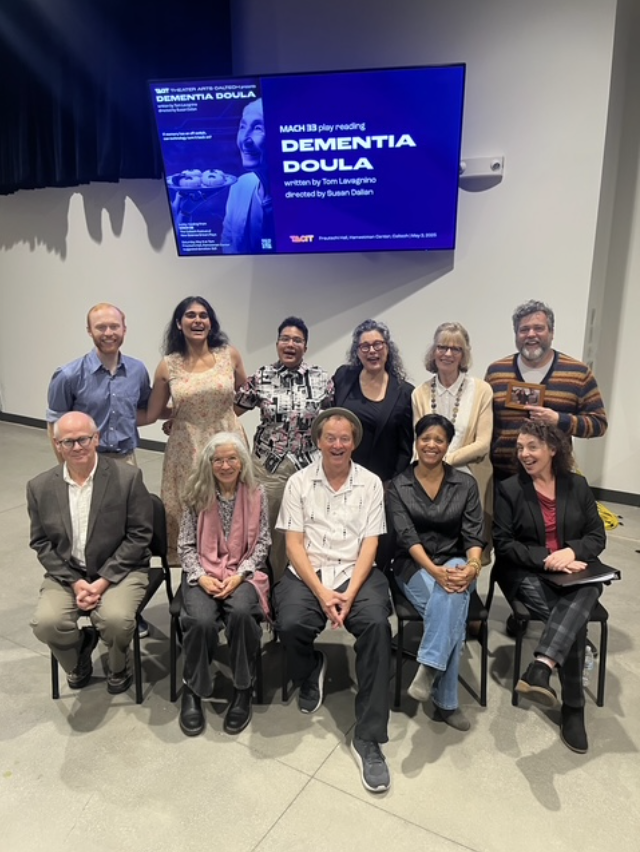Robots and Remembrance: Transcending Memory With Dementia Doula

The cast and crew of the Dementia Doula stage reading. Back, from left: Solvin Sigurdson, Asmat Kaur Taunque, Maria Azcona Baez, Jane Brucker, Laura Gardner, Scott Harris. Front: Joel Burdick, Anna Schlobohm de Cruder, Tom Lavagnino, Susan Dalian, Dana Schwartz. (Photo: Brian Brophy)
On May 3rd, Frautschi Hall, 7 p.m., as part of MACH 33: The Caltech Festival of New Science-Driven Plays, was the latest version of Tom Lavagnino’s Dementia Doula. Like the festival’s other show, entitled The Null Test (which explores the legal hijinks of a self-driving car company), this was a staged reading: the cast, directed by Susan Dalian, performing from scripts on music stands. Originally presented under the name Crisis Goalie at the 2024 Utah Shakespeare Festival, then directed by Britannia Howe, this pared-down staging celebrates the script on its own terms, privileging nuanced acting over elaborate production.
At its heart is Diane, an elderly librarian battling the ravages of dementia, attended by her “super-nerdy but hyper-intelligent” son Carl, her nurturing but “eternally agitated” daughter Peg, and Joanie, an A.I. agent designed to mirror Carl’s deceased wife — a “dead ringer” in every sense. The ensuing narrative turns the stage into a laboratory of memory and identity, brimming with black comedy and psychological erudition.
Opening with dyadic intimacy between Carl and Diane, the play soon blooms into a fascinating study of conflation: signs mix with the signified in ways that are at once charmingly blithe and heartbreakingly alienating. Joanie’s malapropisms (“He got hangover!”—“Tenure,” Carl corrects) elicit laughter, but as Diane’s lucidity flickers (“I remember Peg. I don’t remember you”), the humor morphs into an aching testament to memory’s fragility.
The script’s brilliance lies in how it wrestles with these destabilizations of the familiar, where even the mundane becomes exasperating. As Peg and Carl coax small victories from her mother—“That’s right!” each regularly says, with a tired smile—we’re invited to reckon with the heartbreak of holding the line against relentless decline. “Is Ma knowing the truth more important than Ma being happy?” one character asks, explicating the play’s central dilemma. (The matter-of-fact response: “She’s happy. . . . Why mess it up?”)
The ensemble navigates these layers of affect with impressive restraint. Rather than oversell the sci-fi trappings—as playwright Tom Lavagnino noted, “The play barely has anything to do with robots. It’s about this woman in denial about her malady”—the actors ground their performances in small, telling details. One line, delivered with exquisite understatement, illustrates a character’s emotional distance: “She never offers me a cookie.” In such small moments, the production finds its dynamism and its heartbreak.
The play’s interest in AI technology is a superbly handled undercurrent, reworked from the original with the guidance of science advisor Solvin Sigurdson and “actual dementia doula” Anna Schlobohm de Cruder. Solvin points out how the initial drafts envisioned Joanie as a thought-reading automaton, but this was pared back to something closer to current realities: voice recordings, fragile illusions of continuity. “Of course there’s a difference!” Peg proclaims of the two Joanies. Yet, as the audience observes, A.I. Joanie enriches Diane’s life in all the ways human Joanie did (and more)—ways big and small, human and superhuman.
Is there a difference, from the patient’s perspective? Does the difference from ours matter?
Mixing science fiction and science fact, Dementia Doula is a deft exploration of a dementia made livable. “Dementia means ‘not remembering.’ Not ‘not being happy,’” Carl insists. Indeed, aided by tech that can “turn [memory] back on”—per the play’s tagline—this statement can transcend platitude. The human experience, even without memory, can thus remain its complicated crucible of love, grief, and exasperation. As Carl continues, such a life sans memory is “Maybe not better. But maybe not too much worse.”
This staged reading, assembled by MACH 33 Artistic Director Brian Brophy and enhanced by contributions from Anna and Solvin (with additional input from Professor of Mechanical Engineering Joel Burdick), reveals a play “pretty much there to produce,” as Dalian noted. The direction, conscious of the limitations of the reading format, allows the script’s careful pacing and linguistic wit to breathe, leaning on the power of the spoken word rather than spectacle. As Lavagnino said of the cast, “The group assembled to perform is off the hook,” and indeed, they rise to the challenge: a testament to the marvels of (dis)continuity and the small victories that sustain us.
Dementia Doula is a trenchant and sensitive portrait of the multicolored, irresolvable grief that accompanies neurodegeneration. It is also a gentle, defiant act of remembrance: a reminder that in the smallest of gestures—a cookie offered or withheld, a name remembered or forgotten—we find both the tragedy and the marvel of the human condition.